Net-Zero Hero: Elijah Scott
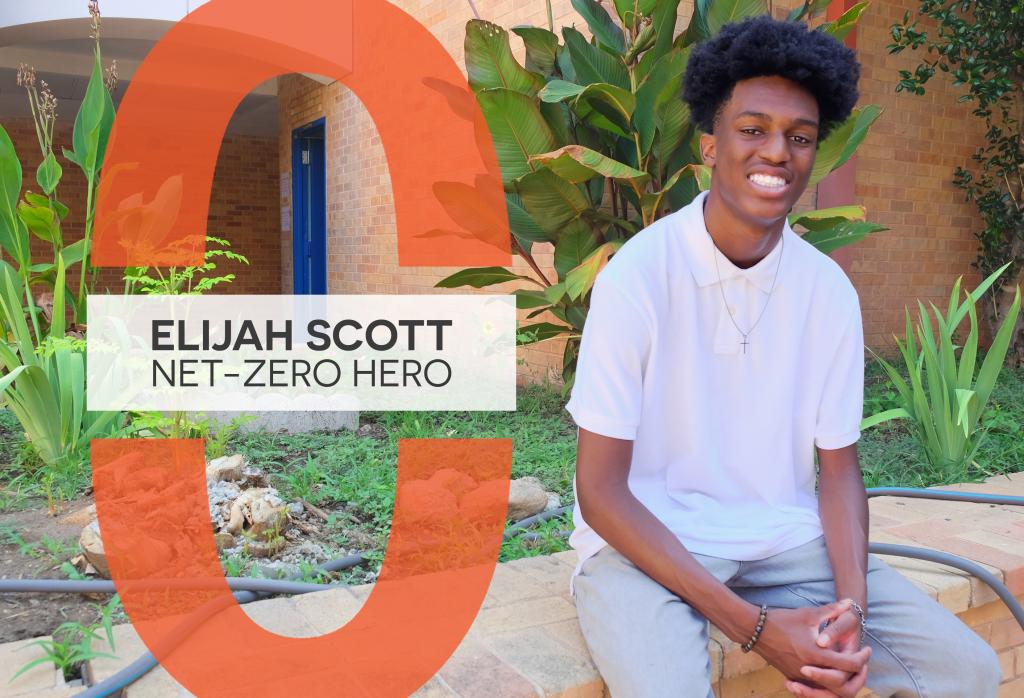
I’m helping to make Austin Net-Zero by supporting eco-conscious organizations through social, financial, and, most importantly, hands-on work within our community.
As we enter a new school year, we’re excited to celebrate student innovation and local youth climate action — and Elijah Scott is a shining example! Last year, Elijah joined the Austin Youth Climate Equity Council, a program designed to help local student leaders learn about and engage in climate action. After participating in this program, Elijah was hand-selected to join EcoRise’s summer internship program, where he had the opportunity to support the mission of Austin’s Cities Connecting Children to Nature initiative. Through these experiences, Elijah has deepened his understanding of local issues and supported green initiatives across our communities. We’re proud to name Elijah as our newest Net-Zero Hero!
We met with Elijah at Martin Middle School, where he spent time this summer mapping green features on campus, to talk about his passion for sustainability and what he hopes the future holds — for himself and our city.
What inspired you to take action?
Having grown up in Austin — a city known for being environmentally progressive — I became motivated to do my part in creating a sustainable and green environment. When the opportunity arose to serve as a youth leader for the Austin Youth Climate Equity Council, led by local nonprofit EcoRise and sponsored by the City’s Office of Sustainability, I was excited to use my skills in field research, data analysis, project planning, and teamwork, to serve a greater purpose within our community.
I was inspired by EcoRise’s mission of mobilizing a new generation of leaders to design healthy, just, and thriving communities for all through environmental education and sustainability. In particular, taking steps to work towards the Austin Climate Equity Plan’s goal of equitably reaching net-zero community-wide greenhouse gas emissions by 2040 was a major motivation.
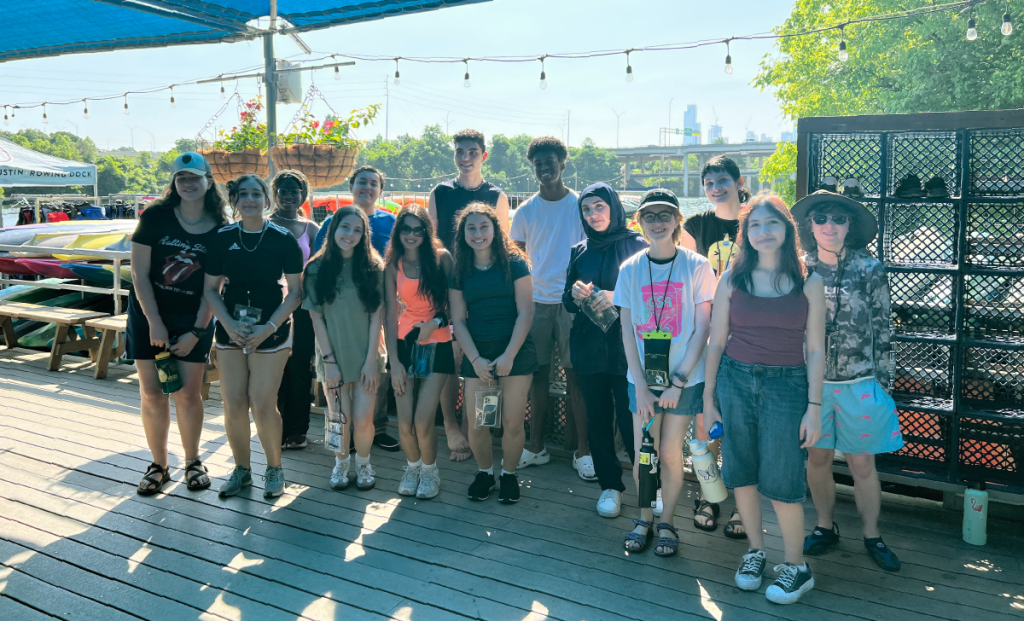
Elijah (center) with the Austin Youth Climate Equity Council.
I’m also currently a student at Liberal Arts and Science Academy (LASA), where I’ve taken science courses specifically geared towards gaining an in-depth understanding of environmental issues. One of my most memorable experiences was studying ecological mapping as a sophomore. During this course, we learned about global warming, emissions, and how cities and organizations try to combat it. It enabled me to see and understand the interrelated complexities of the different elements of the environment and underlined my desire to take action to drive meaningful change.
How did you do it?
My time serving with the Youth Climate Equity Council has been key in allowing me opportunities to lead and participate in eco-conscious initiatives and to partner with other organizations within the Austin community focused on sustainability.
Through the Council, I was able to channel my enthusiasm regarding environmental conservation into very workable projects that would impact the community in a significant and tangible way. We had bi-weekly meetings and daily correspondence to keep our team in sync. I was grateful for the opportunity to work with peers and mentors on eco-friendly projects and experiences, as we collectively strived to create change.
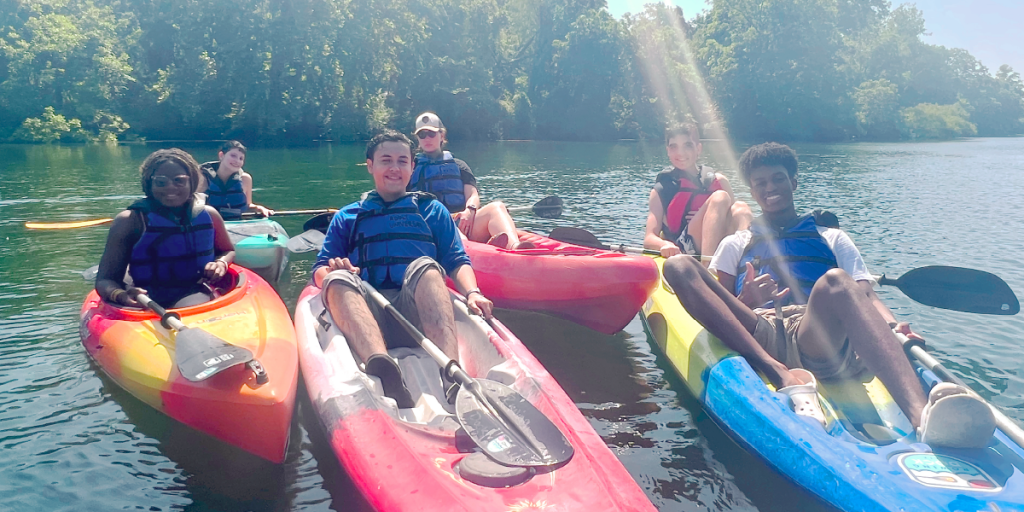
Elijah (right) on a kayaking trip with fellow Council members.
One such project was volunteering at Festival Beach Food Forest throughout the academic year. Activities like pulling out weeds and studying the impact of invasive plants in the Austin region enhanced my understanding of the local environment. Working alongside other key players, such as land managers, community members, and local government representatives, enabled me to have important discussions about caring for the environment and supporting the community — while providing me with multiple opportunities to make a tangible difference.
Working with EcoRise also led me to discover Cities Connecting Children to Nature (CCCN), a group committed to ensuring fair access to outdoor spaces for all children. Over the summer, I used the mapping skills I acquired in my studies to produce comprehensive online maps highlighting ecological features at various schools in Austin. By physically mapping out these features at schools and taking photos for the digital map, I added significant information to demonstrate environmental inequalities and imbalances across Austin's neighborhoods. The information gathered from these mapping activities can shine a light on environmental obstacles and act as solid proof to push for more equitable green areas within the city.
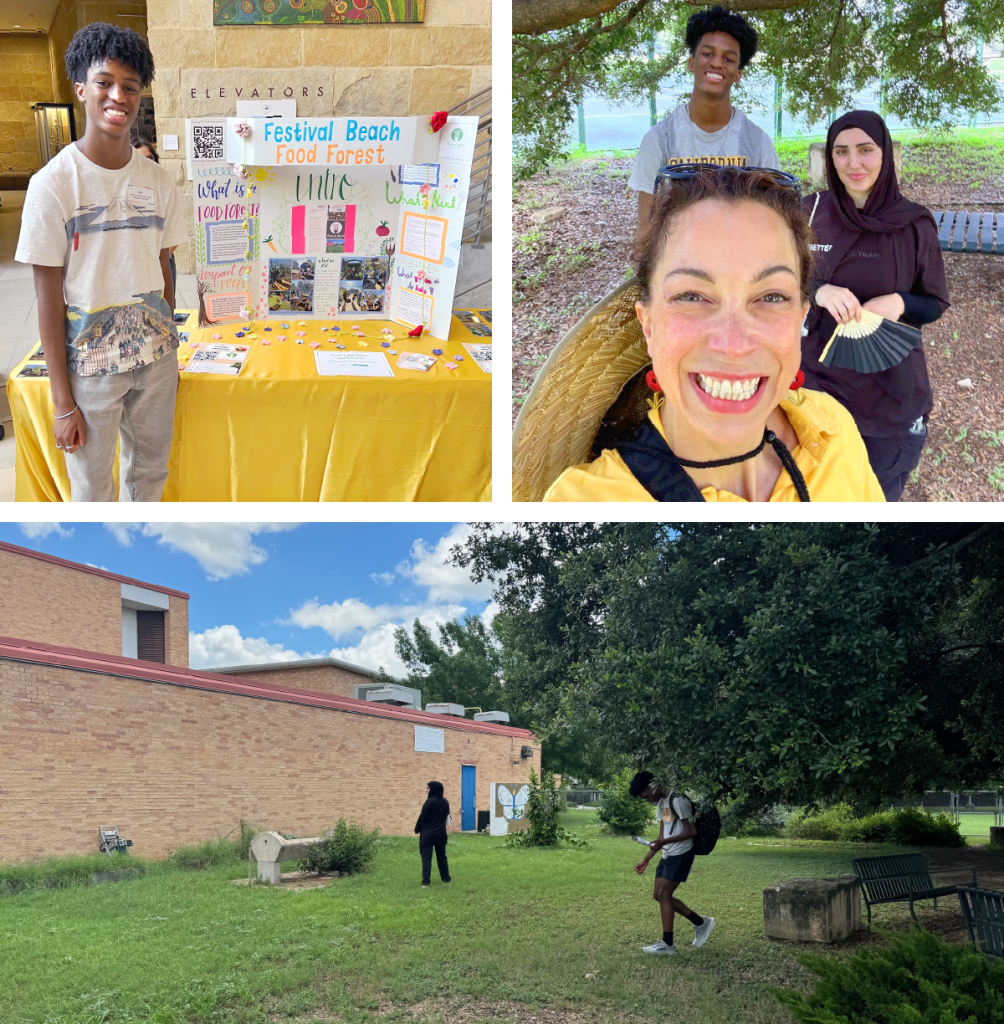
Top (left to right): Elijah presents on his Youth Climate Equity Council project during the 2024 Student Innovation Showcase; Elijah with his fellow CCCN intern Rahila pose for a selfie with one of their mentors, Yasmine Anderson. Bottom: Rahila and Elijah take notes on green features at Martin Middle School.
Overall, being a part of the Council gave me an opportunity to contribute positively through project planning. My involvement with each organization offered the unique opportunity to apply what I learned in my classes to real-world efforts in environmental support.
What’s been most rewarding about getting involved in this way?
The most rewarding part has been the feeling of connection to nature and to communities. I’ve gotten to interact with peers and leaders all working together to further enable and support Austin’s ecological community. Collaborating with individuals of diverse experiences and abilities created an excellent opportunity for learning. Despite being from different backgrounds, everyone was invested in a common goal for different reasons, and experiencing that sense of community was very rewarding.
What’s been the toughest part?
Translating my skill set in research and data analysis from an academic setting to a professional setting proved to be a great opportunity to learn and grow.
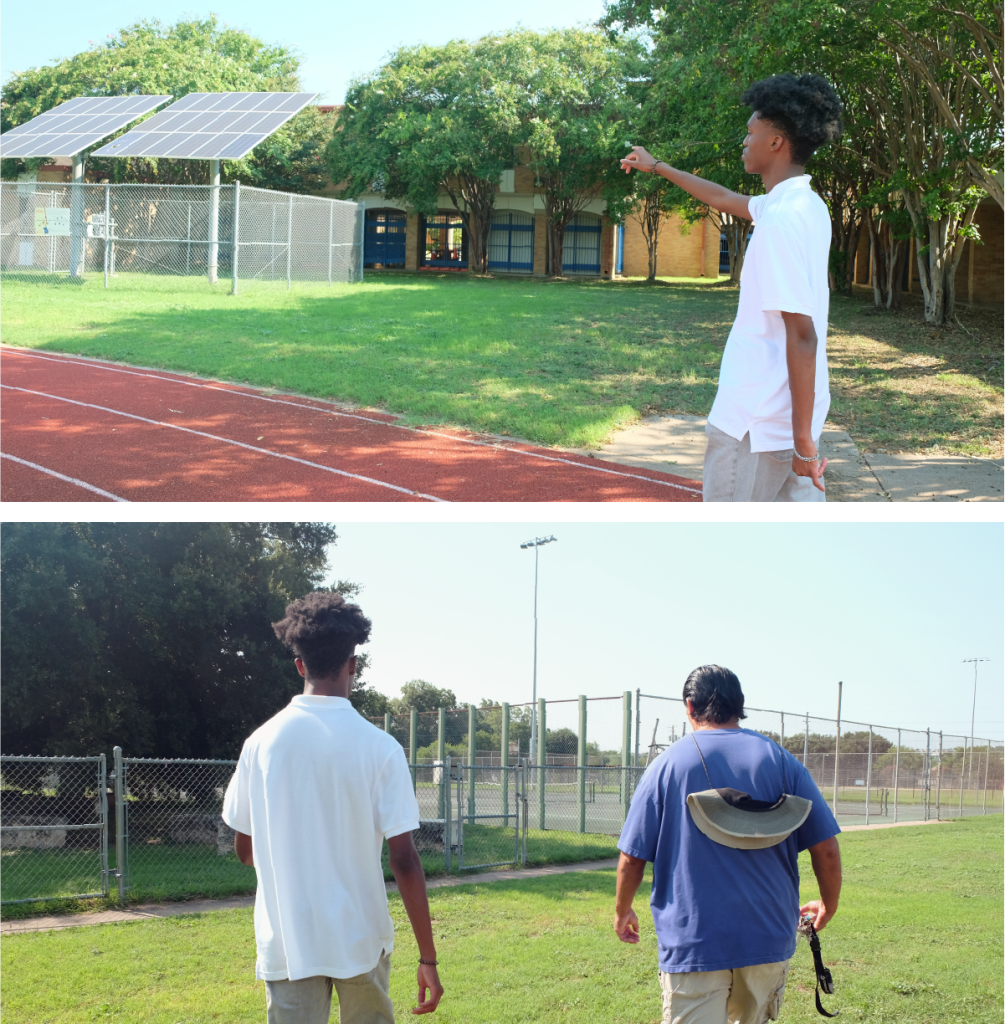
Top: Elijah points out the solar panels at Martin Middle School. Martin was one of the campuses Elijah was most impressed by while collecting data. Bottom: Elijah chats with Martin Athletic Director, Moises Garcia, during our visit to campus.
I’ve learned to focus more on continuous and efficient communication. Working in a professional setting required increased collaboration and information exchange. The whole team remained open and supportive of each other. By engaging with my colleagues, seeking their opinions, and building a supportive network, I not only conquered the most challenging part of my internship, but also strengthened existing skills and acquired new ones that will serve me well in my future career.
What have been some of your biggest takeaways from participating in the Austin Youth Climate Equity Council and EcoRise Summer Internship program?
My biggest takeaway is the importance of personal contributions in collectively creating real change. During my time with the Youth Climate Equity Council, partnering with Festival Beach Food Forest, and with CCCN through the EcoRise Summer Internship program, I've been able to actively participate in environmental conservation projects in Austin. Combining my academic knowledge in ecological mapping with practical use has helped me see environmental issues from a comprehensive perspective and seek creative solutions. Looking ahead, I am dedicated to further promoting environmental awareness and sustainability and understanding the role of personal actions in building a healthier world for future generations.
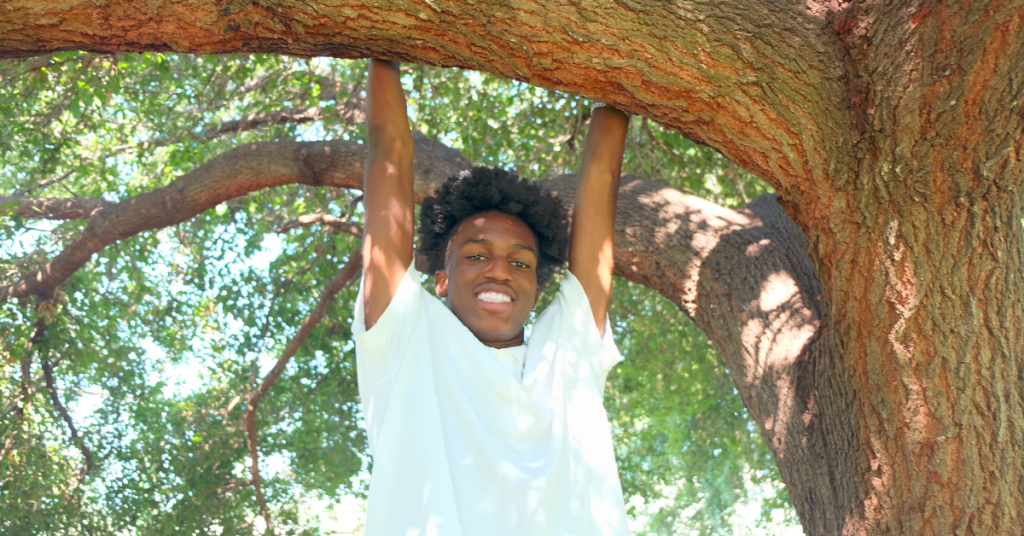
Elijah climbs a large live oak tree in the center of Martin Middle School’s garden. He shared that he would have loved climbing a tree like this if there were one at his middle school.
What’s your vision for yourself in the future and what do you hope to see for the future of Austin?
In the future, I see myself having a career as an urban planner. I have a passion for analyzing how resource placement impacts people's lifestyles. I believe that becoming an urban planner will allow me to empower my community to make sustainable, healthy, and eco-conscious decisions. I’m excited about the prospect of using my skills in design and my commitment to environmental stewardship to contribute to the development of my city's community in a sustainable and equitable way going forward.
I'm excited about what Austin's future holds in terms of being eco-friendly and sustainable. I believe it's crucial to engage young people like myself in these initiatives to guarantee a more eco-friendly future. By gathering additional information on how our actions affect the environment and adopting eco-friendly habits, we can have a major positive effect on both our community and the Earth. Together, we can build a future for Austin that is mindful of the environment and sustainable for future generations. Let's collaborate to bring this dream to life!
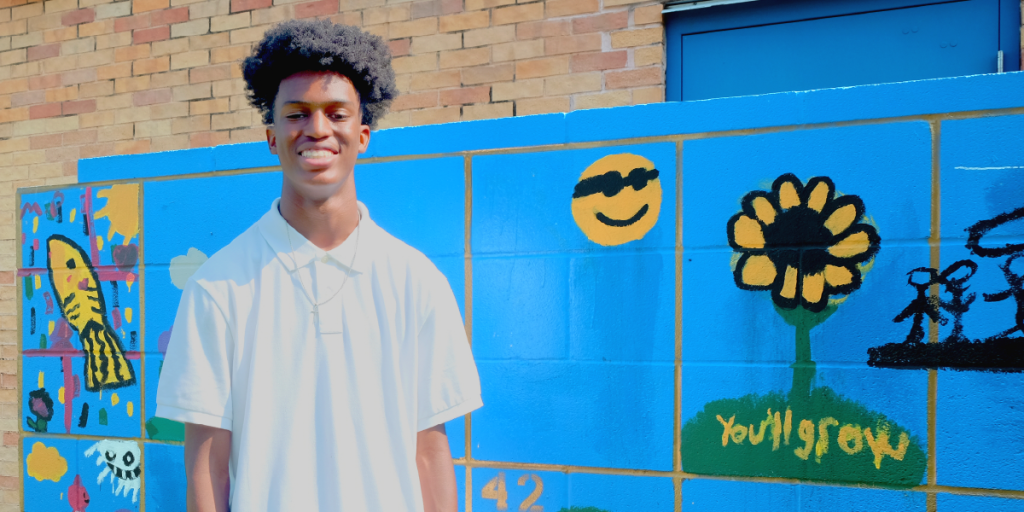
Elijah poses next to a mural in the garden at Martin Middle School.
What advice do you have for others?
A piece of advice I'd give others is to avoid being discouraged by the enormity of the issue. Yes, the goal we’re trying to tackle is a very lofty one, but remember: your efforts are part of a collective movement toward a greener future. Every step you take, regardless of size, is a step forward, and every individual you bring into the fold can enhance that impact. Remember how powerful you are, and why you’re doing what you’re doing.
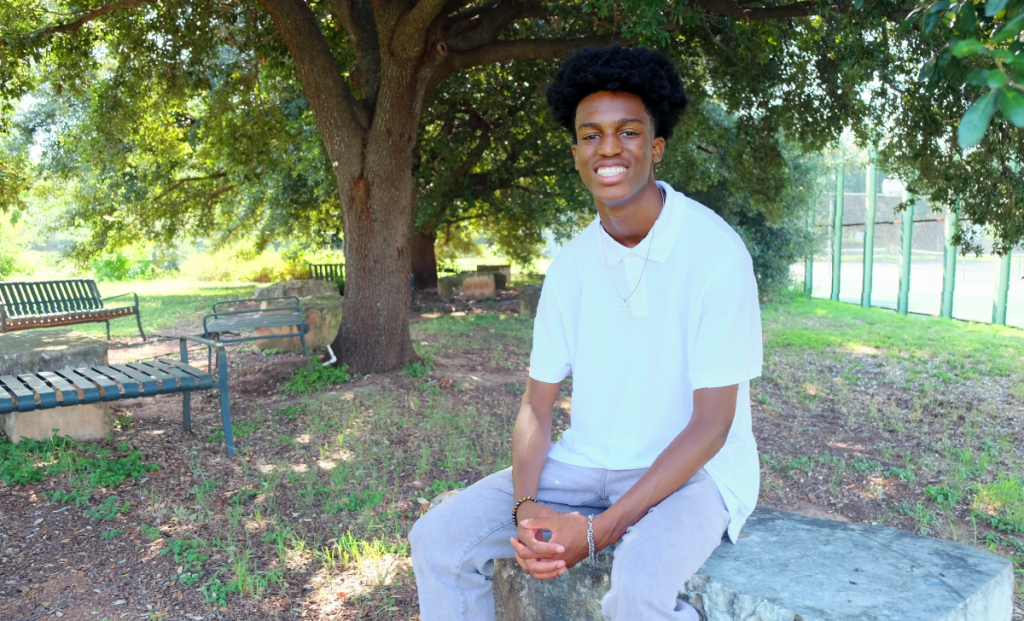
Do you know a young person working to support climate action? Encourage them to learn about the Austin Climate Equity Council. To learn more about Austin's net-zero goal and explore actions you can take to support a greener community, view the Austin Climate Equity Plan.
Share your Net-Zero contributions with us on X (formerly Twitter) or Facebook, and use #NetZeroHero. If you know a Net-Zero Hero (or heroes!) who should be recognized for their efforts, send your nomination to sustainability@austintexas.gov.
